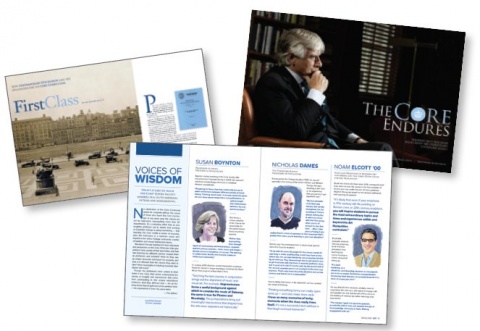Columbia College | Columbia University in the City of New York
On the Centennial Beat

Jörg Meyer
Of course, this was in December; the professors were busy, in the midst of grading end-of-semester papers and preparing for final exams. But they graciously took time out for some thoughtful conversation. Faced with our icebreaker about how long they’d been teaching the Core, more than one confessed to being nervous when they started. But all have been teaching the curriculum for years, and some for decades.

Featuring the Core: This issue, we highlight faculty voices.
The enduring influence of professor on student can be seen more directly in our roundtable with writer David Epstein ’02, JRN’04, GSAS’04 and Julie Crawford, the Mark Van Doren Professor of the Humanities and former chair of Literature Humanities. The two met in the Lit Hum seminar room almost two decades ago, and we got them together again to talk about Epstein’s latest book, Range: Why Generalists Triumph in a Specialized World. The resulting conversation, which originally appeared in our website’s “Like Minds” department, discusses fast versus slow learning, and how embracing a liberal arts education might pay dividends over a quick commitment to a particular path.
Elsewhere in the issue, we interview TIME videographer Francesca Trianni ’11, JRN’13, who recently made her directorial debut with the documentary Paradise Without People. The film, which sold out at DOC NYC 2019, offers a window onto the Syrian refugee crisis through the eyes of two women who have just given birth. We also learned how Nia Batts ’07 is bringing an impressive one-two punch of innovation and community impact to her hometown of Detroit: Her salon, Detroit Blows, has broken new ground with its all-inclusive approach to hairstyling, with a portion of sales going to support local projects by female entrepreneurs.
CCT is breaking a little new ground ourselves — we’re thrilled to be hosting our first event, an evening with famed film director Brian De Palma ’62, here on the Columbia campus on Thursday, March 26. [Editor’s note: The event has been canceled.] The talk celebrates De Palma’s debut novel, Are Snakes Necessary?, excerpted on page 34. The twisty, noirish book marks an apt next step for a man who’s made his career as a master of suspense.
Meanwhile, if you haven’t yet submitted a Core haiku, there’s still time. And the latest installment in our Core Centennial cartoon caption contest series can be found on the back page. Submissions for both of them can be sent to cct_centennial@columbia.edu.
We’re also putting out a call for readers to show us their LGBTQIA+ pride. Send your hi-res digital photo with caption info to cct@columbia.edu (at least one person in the photo must be a College alum). We plan to run a selection of favorites in the Summer 2020 issue — the first of what we hope will be many “billboards” showing different sides of our vibrant Lions community.
Spring Forward!

Editor-in-Chief
Issue Contents
Published three times a year by Columbia College for alumni, students, faculty, parents and friends.
Columbia Alumni Center
622 W. 113th St., MC 4530, 6th Fl.
New York, NY 10025
212-851-7852
cct@columbia.edu
Columbia Alumni Center
622 W. 113th St., MC 4530, 4th Fl.
New York, NY 10025
212-851-7488
ccalumni@columbia.edu

